959
How to stop screaming at kids
Many parents understand that yelling at children is not necessary, and I scold myself for the scream – but for various reasons can not stop. Parents pity, pity the children. I have made a very detailed guide that will teach you what to do, if you really want to stop.

The instructions will not be instructions on how to intimidate and able to train the children to yell at them is no longer required. Also won't magical passes "just understand that...". And most importantly – there will be tragic consequences of the enumeration of the Creek. It's still not working, overburden parents with guilt — but for some reason, each article begins with this.
This manual is only specific steps, schemes and self-help, only hardcore.
Before you start reading, pay a lot of attention to two points: guilt and responsibility.
I know you're drowning in the ocean of guilt and shame every time again failed to hold back, and between these times, and in General almost all the time. You consider yourself a bad, unrestrained, hysterical parent and dread to think how many years your child will go to a therapist when I grow up.
So.
Immediately, stop it right now. You need to stop the flow of toxic guilt, at least during the work with this manual. Not because you are right, not because you behave well, not so. But because while you are in the area of the fault that we will not be able to do anything to change it. It is the fuel that feeds only itself and burns everything around it. So you and for a start it is very important to leave a layer of "rights-guilty" in the layer of responsibility. Try.
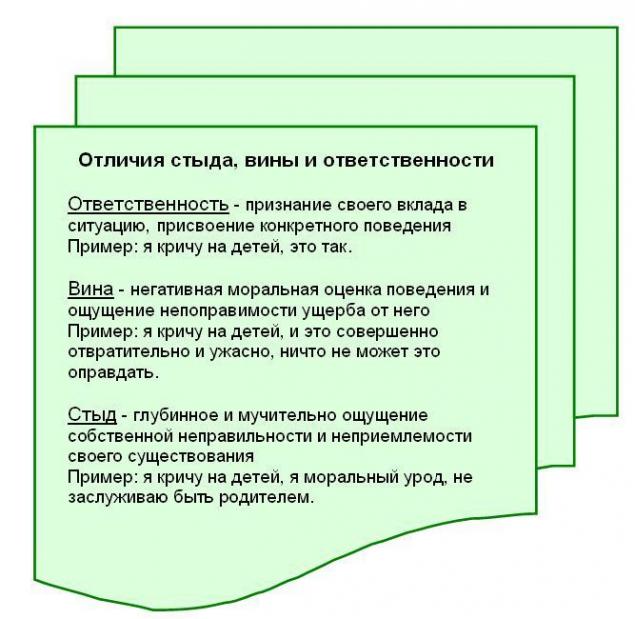
Now, you have struggled to stay in the area of responsibility, not falling into guilt and shame. To save energy and not to pour water on this mill because you will need it for the other. Agreed?
Before you learn not to scream, pass some of the time. At least a few weeks, sometimes months. If you cry often, it is already old and strong pattern. It is impossible to learn a different pattern (old always lies closer and does not require effort). So, some time you will be learning, trying new things and accumulate experience. Most likely, during this time, you'll go off again to the Creek. It is normal for several reasons:
— first of all, absolutely no one can just "get up and go", have to fall and stumble;
— secondly, a relapse – a relapse is not always, sometimes it's "last check" before the final transition to a new life;
— thirdly, the children sharpened by the fact that sampling of parents for strength and stability. In this part of their children's process, so they can invent new ways to take you for a reaction while you deal with the old.
But you will eventually cope with everything, I'm sure. Just not immediately, not instantly. You need to be patient.
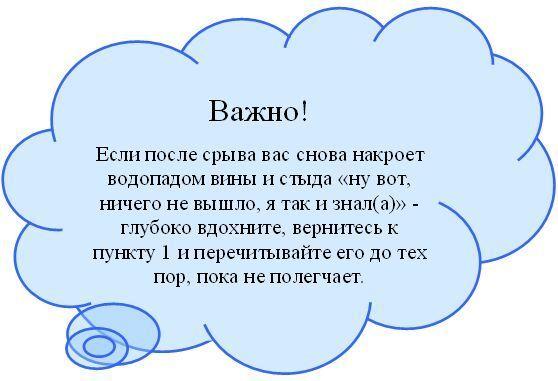
Well, here goes.
Will tell you about the wonderful things begin to happen, when you stop to shout:
Children will feel safe with you, and will not be afraid of you;
The children will feel that you keep everything under control, that you are more strong and responsible figure than they;
Children will learn many ways of reacting in situations when someone is tired, angry, exhausted, etc.;
Children will learn responsibility and get used to find ways of solving problems, not only means the descent of the emotions to ease;
Children will learn that to solve sometimes you need to change your behavior, and not just to wait it out;
Children will listen to you not only when you speak in a loud voice; and, in principle, will no longer listen to you;
Children will not be screaming on others, including then to their children.
Why are you shouting? There are background factors of the Creek and its immediate causes. Let's consider them separately.
Maternal isolation:
Can be a father, and Babushkinskaya. Condition — stretch you are solely responsible for the child 24/7, months and years in a row, which is severely restricted in his personal and social life. This is one of the known risk factors of parental aggression. The term "parent" means the most frequently isolated women, including in the presence of men. The mechanism is: the parent who feels "trapped" because of the baby, and is forced to pull the burden of parenthood alone, gradually tired. When fatigue is close to critical, begins to accumulate natural defense against anger.
Exhaustion:
We include here the lack of sleep, any overloads, the background of the fatigue life, depression, many chronic diseases and other things that consume your mental and physical resources. People are not made of iron, this seems to be a clear and simple thing, but we studiously ignore it and trudge on, on parole and on one wing. But the smaller the resource, the primitive psychic protection (because of forces on more complex anymore). Among the most primitive — always somewhere there and cry.
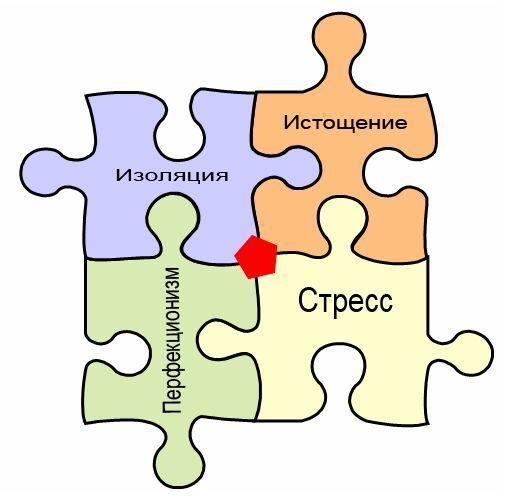
Perfectionism:
Parents who are perfectionists crazy hard life is (without a hint of irony say). Any children's pieces of raging plasma, the chaos with a capital H. Not every adult with a stable psyche unable long to withstand them. And the person unstable, which is very-very important the order and correctness of what is happening, especially difficult with children. If children also your, they, in addition to putting the chaos around and inside, even personally and emotionally involved parents, because they are not "right". Do not conform to any rules and laws, do not meet expectations and so on. In hell for perfectionists — not dented pots, I think, and children. A lot of children. Scream here.
Stress:
The cry of a parent is one of the possible automatic stress responses of the psyche to a strong negative event associated with the child. So strong that the system "parents-children" is under threat (real or perceived). In response to the threat in the body of the parent starts a natural process that changes the chemistry of the brain and body. The process is similar to that in case of danger. So we can act quickly in the body begins to produce certain hormones, the bloodstream they go to the organs-targets (heart, brain, muscles). In these moments, complex and rational part of the brain temporarily "shut down", to reduce the time for reaction. We start to use more ancient and more "animal" part of the brain. Unfortunately, all her answers are reduced to the well-known "fight, freeze or flight", so thoughtful and safe parental behavior does not work.
Helplessness and despair:
Your child again and again does something wrong. But it is not so much perfect execution, but the feeling that he at least learns and changes, And his feelings, no. Everything is exactly as it was. You fight like a fish on the ice, you spend the last of his strength, and still can't move things and change. And in another situation that is similar to the previous mirror, there is a powerless cry: I CAN'T take it ANYMORE!
Completely ending power:
This protective cry. It appears when there is a real threat to your mental state. For example, you have exhausted your mental and physical strength, but child, house, life, and environment continue to demand that you return right now, not asking if you. At a time when the forces remained the last straw, and someone else demands something, your body sounds the alarm — and this demand begins to be regarded as an attack. And we shout: STOP! GET AWAY FROM ME!
Rage:
Doctor, Psychotherapist, psychoanalyst, wrote that all mothers know that children they are governed, exploited, tortured, dried and criticize, and periodically every mother hates their child, which is quite natural. Unfortunately, different moms very differently resistant to this conflict — both love and hate the same child. Those who don't get to keep this balance, often unable to yell, and not just him.
The feeling that we are torn apart:
Also protective Creek, have to stop tearing. One child crying, one right now wants to play cops and robbers and waving a plastic knife in your face, loud phone rings, the husband from the other room asked for it, you stumble and drop the Cup, and you need to immediately sweep up the shards, otherwise someone's gonna get cut. At the time of the overlapping of many requirements of aggressive environment, your psyche includes a red signal: DANGER! ME NOT ENOUGH FOR ALL!
The disappointment in the child:
Do you know the nagging feeling when your child is well knows and remembers, and at the lesson or at a concert of grunts, is wrong and shows the level is much lower? And you know if the unpleasant feeling, when you explain to him 30 times, and on the 31st it turns out that he did not understand? And when you discover that something he's still very primitive thinks and acts, although seemingly intelligent? But what you happens when the other kids are better and smarter? Not sneaking whether bitter thoughts that something is wrong?.. This is called "violated expectations" and the more experienced, the higher these expectations were originally. Unfortunately, few people know that children are children. If the child slows down on "the show of skills and knowledge" that he's not dumber than you thought, just from the stress of losing part of brain resource. That is, your child is not the perfect, who in any situation gives excellent results. Mostly the parents about this nowhere to learn, and they fight on their expectations is very painful. Screaming from pain on children.
To trigger the personal trigger:
A trigger is an event-irritant, that gives you an immediate violent reaction. Usually all triggers come from the past and mean or unexamined (micro)trauma or negative experience. For example, you do not carry a double message. Or do you "drop visor" when around loud squeal. Or you literally throws up when you kill and not allowed to finish. Or do you twitch when you touch without asking. Or you will instantly come into a rage at the hint that you are a bad mother. And so on. A trigger is always a portal into a piece of living past the pain, and the result on the level of your behavior is appropriate.
Damages and desire to punish:
This Creek is a frequent consequence of childhood trauma of the parent (including from screaming and corporal punishment in his own childhood). Travmatiki, even designed, very Malorechensky. And they for life remain in the memories of the nightmare that they had to survive with the trauma, at the time a lack of resource was critical. They don't want there anymore. They prepared teeth and claws to defend themselves, if you feel that you will slide back. Therefore, parenting for travmatikov – individual call all of their forces, not only because of the threat to the resource. But because on stage every now and then popping the characters of the triangle of Karpman. For example, the desire to yell at a child for their moral or other harm is a cry of pain and rage victim: PUNISH the AGGRESSOR!
The sense of loss of control and helplessness:
It is important not to get confused. The Creek itself the moment of loss of control and helplessness. But sometimes it cause also in the sense of loss of control and helplessness. Such a vicious circle. For example, we for some case it is very important that everything was in order. Time – and something was out of order, we did. Two – again a failure. Has done it again, but with difficulty. Three, four, five... At some point strength is not enough, and everything goes to hell. You shout or not – depends on how you want to maintain control specifically here and in life in General. If control – your sore subject, you'll often break it on the item.
Experienced fear for the child:
I don't mean that scream SCHOOOL!, which we publish, if we see that the child is now running under the car. No, I'm talking about the screaming after the fact, when the threat has passed. You have probably seen parents yell at children or punish them after being pulled from dangerous places, or found lost, etc.? The reason – the extremely powerful emotion of fear which the mind of the parent is not able to cope on their own. Habits no, for example, or no one ever taught you, or something. Then all this waterfall falls on the one who caused the feelings. No matter that it is small and this emotion does not have to answer.
The sense of his imperfection as a parent:
When we have children, it's quite normal to fantasize about how it would be. What they will be children, what we will become parents. Imagination, one way or another, revolve around the "ideal image" — someone is pastoral with three happy children and a relaxed mom for Sunday Breakfast on the veranda, someone else. Not for me to tell you that the reality of parenthood, tend to be quite the opposite. And when we are very hurt collided about their failures to achieve this ideal, when we are afraid that the child will see our parent's mistakes and will get it, too – we can shout.
The desire to "blow off steam":
The point is partially similar to paragraph 9, with one small difference. In this embodiment, the parent yells at the child from their own powerful experiences to which the child has no relations, even indirectly. Came to hand, in short, was not strong enough to answer. Unfortunately, those who are screaming for this reason, very rarely read these manuals, because for them the scheme "hit the nearest weaker" works all his life, and they consider it very correct.
What to do with all this?
I think we need to learn new behaviors, reactions and habits that will help you in all these moments – so you can avoid them "without a fight".
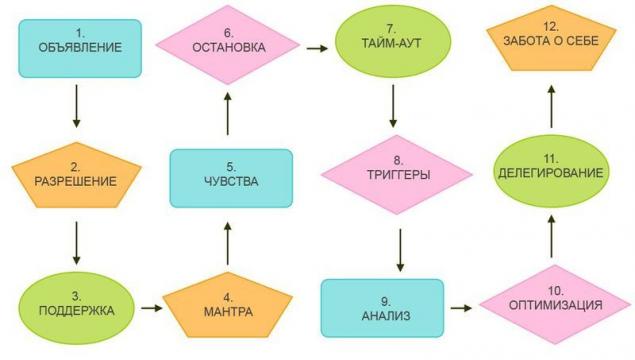
1.Ad.
Directly announce to the children and family, what are you going to stop screaming. It is psychologically extremely difficult to do, but at the same time, it will be very helpful (not only to re-establish contact, but don't give up). You can add that will learn, and, unfortunately, will learn not at once. Errors will happen, but you gradually get better and better you'll be able to control yourself and in the end sure of victory cry.
2.Permission.
Give the children permission to interrupt or leave the room when you begin to cry. Without consequences for them. Yes, it's rude and against the rules of decency, but your cry too, they do not fit. So give children this opportunity action, so they don't feel victims. In addition, the child thus will give you a very clear signal that you have lost control — that in itself will help to return to reality.

3.Support.
Ask for support and assistance from family and close friends. Talk to them, acknowledge their problem. It may well be (and probably will be) that some of them had or have similar difficulties. Perhaps loved ones will also be fresh ideas that can be done, or useful observation from your typical triggers. Great if some of them agree to help you right at the moment of scream – you can agree how.
4.Mantra.
Come up with a mantra that will be your lifeline and the emotional catapult of the funnel. Accustomed to remember and use it in situations when you storm, you've lost control and don't know what to do. This is usually a simple phrase of 3-5 words to mean something that you would want to strive for everything started. I really like, for example, like this: "I choose love". Or met another version of "the Scream only to salvation." If to speak these words to yourself at the moment of loss of control, to stop much easier.
5.Feelings
In our mentality are very common the two extremes: either hoard emotions, or let off steam in everyone. Often, one into another – the pressure in the boiler builds up and the cap breaks, and then hoard until the next breakdown. Meanwhile, both harmful to health and family. Start to develop an interim solution: observe your emotions, acknowledge them and give them a place. Which means if you put feelings and experiences into fellowship BEFORE you start to burst the head.

6. Stop.
Stop in any time. Not only in early quarrels, not only when you are already tired of the screaming. No, in the middle of a sentence, and when you are emotionally off, and when you have suffered – in General, in any moment, as soon as you realized that again there is something wrong. At any time you can interrupt themselves and not to continue further, and this is a huge breakthrough, and you'll be good. When you do it the first time — learn how this resource feeling. I wish you very soon to try it out.
7.Timeout.
Use parent time-out. What exactly does that mean? If you found that out, we split up with the child physically move away from him (preferably in another room). Wash – better than cool water. Drink water or eat something small like crackers or apples. Deeply and slowly breathe, 10-15 times. And go back to the child, not earlier than 5-7 minutes. All that you need to biochemical compounds in your blood and in the brain responsible for anger, stress and impulsive actions, decayed or transformed.
8.Triggers.
It is quite natural to lose your temper, if you attack something insurmountable and painful. So you need to think about how to bring these attacks to a minimum. Write down on a sheet, all the triggers that throw you personally in the area of the Creek (see the theoretical part it is possible to take from there and add your own). Hang this sheet where you will see it often. Gradually learn the triggers accustom to note their appearance, as well as the superimposition of triggers. Once you are good to navigate and see all the time, start planning the avoidance, elaboration, or compensation triggers (to plan early doesn't make sense, because the choice appears only after you're comfortable with supervision)
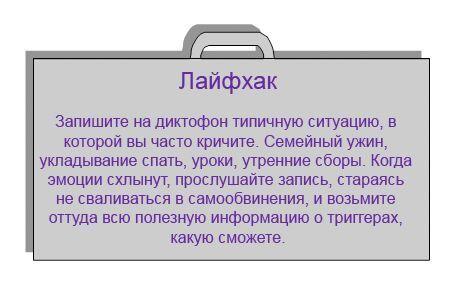
9. Analysis
The point is interconnected with the previous one. Carefully watch your life and how much you "risk zones" and how they are distributed. For example, the periods when you are tired, when triggers are superimposed on each other when you are overloaded with tasks or were in a desperate situation.
Great will eventually make some sort of table, graph or map in which are marked the problem areas. Yandex-traffic jams can you imagine that? Something like this might look: road green – it's all right, it becomes yellow – need higher care, if you go into the red zone – high risk of collapse and cry.
Give here an example of the spherical plate as a working mother with two children. In each cell of the date and time entered business and the processes that potentially threaten to derail the internal "regulator". In brackets explanation. Empty spaces indicate that at this time, all "pure". Then you can paint all the "dangerous" cases in red, medium in yellow, and "almost good" in green, and see what happens.
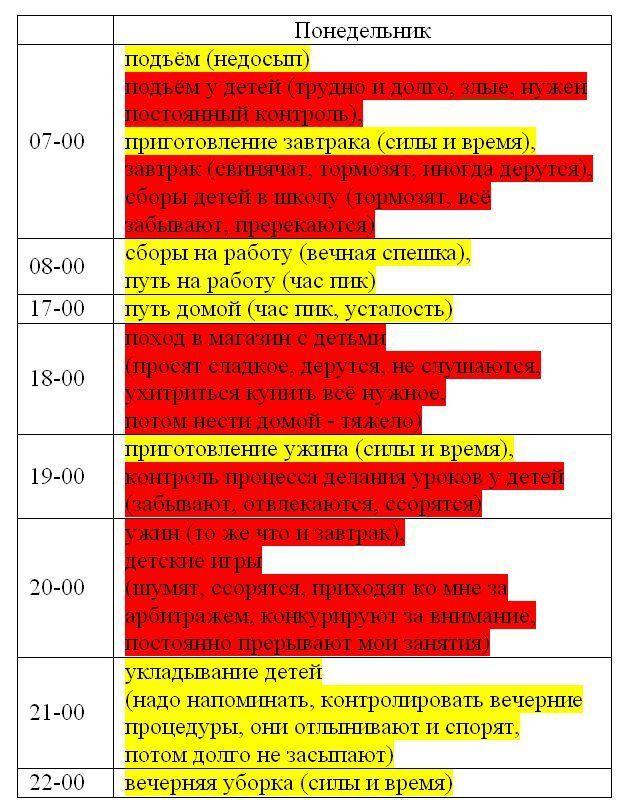
More than three yellow or red 1-2 in a row – a potential breakdown and cry. Some yellow and some red together – almost guaranteed breakdown and cry (here it is clearly the morning and evening from 18 to 20 hours).
If you like numbers, evaluate each case on a 10-point scale. 0 – rosy, 10 – extremely difficult and forces. Then fold the scores and make something like graphics, for example.
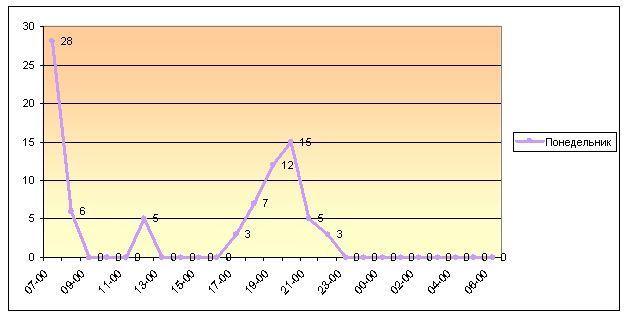
Immediately see where the peak voltage (usually a potential area of failure is 15 points more, but you can have individual value above or below).
This is one way you can invent your own. The essence of all these visualizations, first, that you have learned to perceive your day as a tracker, with natural UPS and downs of energy and mental strength, and were able to see the entrance to the risk area. You can ask for help and substitution when you feel that the limit is close. And the estimates and schedules are less to blame, because it becomes very clear that you have actually depleted the shared resource.
10. Optimization
Think of what and where in your life change, as many "red zones" have turned into "yellow" (or points dropped to 10-12 at least). Believe me, I understand very well how it can be difficult and even impossible. But, unfortunately, the answer is "nothing and nowhere can not be changed" would mean that you will continue to fall at exactly the same places as before. Because if you have a Wednesday day is designed so that to 17-00 not exhausted, and you need to function on and to 23-00't sit down – then I have bad news for you. There is no magic solution, however.
11. Delegation.
Give and delegate as much as possible. Not only where possible, but where it is impossible. But on the part of a hammer (especially if there is no one to give and delegate). Yes. Very often shout in the family of those who is overloaded with responsibility (including the fact that no one else wanted to take it). And give it to wildly difficult, because rooted. I bet you only know how and time to do what is required. Certainly family members with the same not up to the task at all or do so that then all the worse. Then, they will have to learn, and you temporarily suffer poor results. Yes, they may be dissatisfied with the fallen load, especially if you dragged it all without a murmur. But I strongly suspect that your nigricana children — in the interests of all, and it makes sense to clearly convey.

12. Taking care of yourself
Give yourself time to relax. Preferably, at least an hour a day. Remember the joke "Sha children, I make you a good mom"? You definitely need this time, free from kids, life, work and other concerns, and not just once a week and more often. Because if the vessel is regularly empty, it must also regularly fill. Most likely, attempts to regain personal time will first run into resistance — the same children and a spouse (children, by the way, do not quite understand that the parents don't belong to them). But it is the key to your mental adequacy, so you have to be persistent.
Tired? Nothing, it's almost the end.
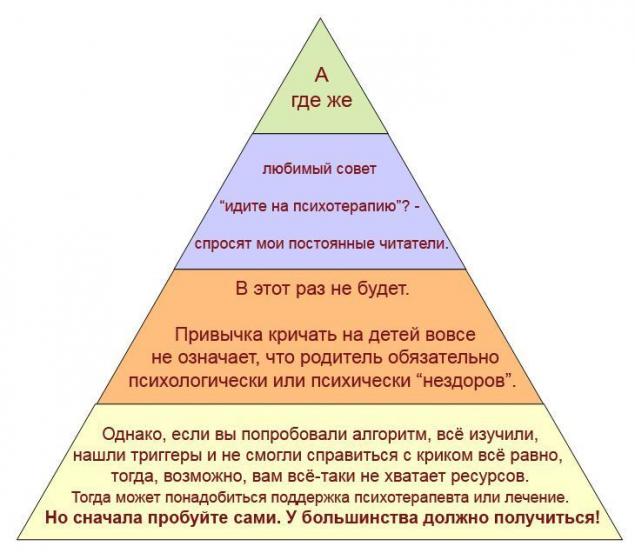
And one last thing:
Is it possible to do something with the screaming until you learn the algorithm and are working on a strategy? . There are a number of little tricks that allow you to temporarily "turn off" cry. I call them cheat because they are not very reliable, the problem does not change and only work on one or two specific situations. But for the first time will do.

And finally...
Who has read this far and not tired of that fellow. The last thing I want to say here is...

It's their job. They are immature people, they learn how it all works and generally what to expect from the world. They definitely need to try your limits, to understand where their own, and that you can rely on. They will experiment with the religion of Islam and thus learn responsibility. Their prefrontal cortex is still underdeveloped, so emotions often take the upper hand, and they lose the ability to think and respond adequately.
They're just kids.
And you started yelling at them not because you had nothing to do. Often it is absorbed from family, from their own parents. And many of us have no other samples, so it may seem that these bad patterns ingrained tightly, they can not be overcome.
So.
I want to draw your attention to the fact that you have a lot of tools and resources. Your parents did the best that I was capable of, but they did not have psychotherapy, the Internet, research on child psychology, courses and groups for parents, this manual, and more. We have, in addition to all these lovely pieces, knowing that their ways didn't work. We can create your new ways, and its parent behavior — at least on this basis. In fact, our database is much more.
You are a wonderful mom and dad, and I'm sure you will succeed. published
Author: Catherine Sigitova
P. S. And remember, only by changing their consumption — together we change the world! ©
Source: f3.livejournal.com/114764.html

The instructions will not be instructions on how to intimidate and able to train the children to yell at them is no longer required. Also won't magical passes "just understand that...". And most importantly – there will be tragic consequences of the enumeration of the Creek. It's still not working, overburden parents with guilt — but for some reason, each article begins with this.
This manual is only specific steps, schemes and self-help, only hardcore.
Before you start reading, pay a lot of attention to two points: guilt and responsibility.
I know you're drowning in the ocean of guilt and shame every time again failed to hold back, and between these times, and in General almost all the time. You consider yourself a bad, unrestrained, hysterical parent and dread to think how many years your child will go to a therapist when I grow up.
So.
Immediately, stop it right now. You need to stop the flow of toxic guilt, at least during the work with this manual. Not because you are right, not because you behave well, not so. But because while you are in the area of the fault that we will not be able to do anything to change it. It is the fuel that feeds only itself and burns everything around it. So you and for a start it is very important to leave a layer of "rights-guilty" in the layer of responsibility. Try.

Now, you have struggled to stay in the area of responsibility, not falling into guilt and shame. To save energy and not to pour water on this mill because you will need it for the other. Agreed?
Before you learn not to scream, pass some of the time. At least a few weeks, sometimes months. If you cry often, it is already old and strong pattern. It is impossible to learn a different pattern (old always lies closer and does not require effort). So, some time you will be learning, trying new things and accumulate experience. Most likely, during this time, you'll go off again to the Creek. It is normal for several reasons:
— first of all, absolutely no one can just "get up and go", have to fall and stumble;
— secondly, a relapse – a relapse is not always, sometimes it's "last check" before the final transition to a new life;
— thirdly, the children sharpened by the fact that sampling of parents for strength and stability. In this part of their children's process, so they can invent new ways to take you for a reaction while you deal with the old.
But you will eventually cope with everything, I'm sure. Just not immediately, not instantly. You need to be patient.

Well, here goes.
Will tell you about the wonderful things begin to happen, when you stop to shout:
Children will feel safe with you, and will not be afraid of you;
The children will feel that you keep everything under control, that you are more strong and responsible figure than they;
Children will learn many ways of reacting in situations when someone is tired, angry, exhausted, etc.;
Children will learn responsibility and get used to find ways of solving problems, not only means the descent of the emotions to ease;
Children will learn that to solve sometimes you need to change your behavior, and not just to wait it out;
Children will listen to you not only when you speak in a loud voice; and, in principle, will no longer listen to you;
Children will not be screaming on others, including then to their children.
Why are you shouting? There are background factors of the Creek and its immediate causes. Let's consider them separately.
Maternal isolation:
Can be a father, and Babushkinskaya. Condition — stretch you are solely responsible for the child 24/7, months and years in a row, which is severely restricted in his personal and social life. This is one of the known risk factors of parental aggression. The term "parent" means the most frequently isolated women, including in the presence of men. The mechanism is: the parent who feels "trapped" because of the baby, and is forced to pull the burden of parenthood alone, gradually tired. When fatigue is close to critical, begins to accumulate natural defense against anger.
Exhaustion:
We include here the lack of sleep, any overloads, the background of the fatigue life, depression, many chronic diseases and other things that consume your mental and physical resources. People are not made of iron, this seems to be a clear and simple thing, but we studiously ignore it and trudge on, on parole and on one wing. But the smaller the resource, the primitive psychic protection (because of forces on more complex anymore). Among the most primitive — always somewhere there and cry.

Perfectionism:
Parents who are perfectionists crazy hard life is (without a hint of irony say). Any children's pieces of raging plasma, the chaos with a capital H. Not every adult with a stable psyche unable long to withstand them. And the person unstable, which is very-very important the order and correctness of what is happening, especially difficult with children. If children also your, they, in addition to putting the chaos around and inside, even personally and emotionally involved parents, because they are not "right". Do not conform to any rules and laws, do not meet expectations and so on. In hell for perfectionists — not dented pots, I think, and children. A lot of children. Scream here.
Stress:
The cry of a parent is one of the possible automatic stress responses of the psyche to a strong negative event associated with the child. So strong that the system "parents-children" is under threat (real or perceived). In response to the threat in the body of the parent starts a natural process that changes the chemistry of the brain and body. The process is similar to that in case of danger. So we can act quickly in the body begins to produce certain hormones, the bloodstream they go to the organs-targets (heart, brain, muscles). In these moments, complex and rational part of the brain temporarily "shut down", to reduce the time for reaction. We start to use more ancient and more "animal" part of the brain. Unfortunately, all her answers are reduced to the well-known "fight, freeze or flight", so thoughtful and safe parental behavior does not work.
Helplessness and despair:
Your child again and again does something wrong. But it is not so much perfect execution, but the feeling that he at least learns and changes, And his feelings, no. Everything is exactly as it was. You fight like a fish on the ice, you spend the last of his strength, and still can't move things and change. And in another situation that is similar to the previous mirror, there is a powerless cry: I CAN'T take it ANYMORE!
Completely ending power:
This protective cry. It appears when there is a real threat to your mental state. For example, you have exhausted your mental and physical strength, but child, house, life, and environment continue to demand that you return right now, not asking if you. At a time when the forces remained the last straw, and someone else demands something, your body sounds the alarm — and this demand begins to be regarded as an attack. And we shout: STOP! GET AWAY FROM ME!
Rage:
Doctor, Psychotherapist, psychoanalyst, wrote that all mothers know that children they are governed, exploited, tortured, dried and criticize, and periodically every mother hates their child, which is quite natural. Unfortunately, different moms very differently resistant to this conflict — both love and hate the same child. Those who don't get to keep this balance, often unable to yell, and not just him.
The feeling that we are torn apart:
Also protective Creek, have to stop tearing. One child crying, one right now wants to play cops and robbers and waving a plastic knife in your face, loud phone rings, the husband from the other room asked for it, you stumble and drop the Cup, and you need to immediately sweep up the shards, otherwise someone's gonna get cut. At the time of the overlapping of many requirements of aggressive environment, your psyche includes a red signal: DANGER! ME NOT ENOUGH FOR ALL!
The disappointment in the child:
Do you know the nagging feeling when your child is well knows and remembers, and at the lesson or at a concert of grunts, is wrong and shows the level is much lower? And you know if the unpleasant feeling, when you explain to him 30 times, and on the 31st it turns out that he did not understand? And when you discover that something he's still very primitive thinks and acts, although seemingly intelligent? But what you happens when the other kids are better and smarter? Not sneaking whether bitter thoughts that something is wrong?.. This is called "violated expectations" and the more experienced, the higher these expectations were originally. Unfortunately, few people know that children are children. If the child slows down on "the show of skills and knowledge" that he's not dumber than you thought, just from the stress of losing part of brain resource. That is, your child is not the perfect, who in any situation gives excellent results. Mostly the parents about this nowhere to learn, and they fight on their expectations is very painful. Screaming from pain on children.
To trigger the personal trigger:
A trigger is an event-irritant, that gives you an immediate violent reaction. Usually all triggers come from the past and mean or unexamined (micro)trauma or negative experience. For example, you do not carry a double message. Or do you "drop visor" when around loud squeal. Or you literally throws up when you kill and not allowed to finish. Or do you twitch when you touch without asking. Or you will instantly come into a rage at the hint that you are a bad mother. And so on. A trigger is always a portal into a piece of living past the pain, and the result on the level of your behavior is appropriate.
Damages and desire to punish:
This Creek is a frequent consequence of childhood trauma of the parent (including from screaming and corporal punishment in his own childhood). Travmatiki, even designed, very Malorechensky. And they for life remain in the memories of the nightmare that they had to survive with the trauma, at the time a lack of resource was critical. They don't want there anymore. They prepared teeth and claws to defend themselves, if you feel that you will slide back. Therefore, parenting for travmatikov – individual call all of their forces, not only because of the threat to the resource. But because on stage every now and then popping the characters of the triangle of Karpman. For example, the desire to yell at a child for their moral or other harm is a cry of pain and rage victim: PUNISH the AGGRESSOR!
The sense of loss of control and helplessness:
It is important not to get confused. The Creek itself the moment of loss of control and helplessness. But sometimes it cause also in the sense of loss of control and helplessness. Such a vicious circle. For example, we for some case it is very important that everything was in order. Time – and something was out of order, we did. Two – again a failure. Has done it again, but with difficulty. Three, four, five... At some point strength is not enough, and everything goes to hell. You shout or not – depends on how you want to maintain control specifically here and in life in General. If control – your sore subject, you'll often break it on the item.
Experienced fear for the child:
I don't mean that scream SCHOOOL!, which we publish, if we see that the child is now running under the car. No, I'm talking about the screaming after the fact, when the threat has passed. You have probably seen parents yell at children or punish them after being pulled from dangerous places, or found lost, etc.? The reason – the extremely powerful emotion of fear which the mind of the parent is not able to cope on their own. Habits no, for example, or no one ever taught you, or something. Then all this waterfall falls on the one who caused the feelings. No matter that it is small and this emotion does not have to answer.
The sense of his imperfection as a parent:
When we have children, it's quite normal to fantasize about how it would be. What they will be children, what we will become parents. Imagination, one way or another, revolve around the "ideal image" — someone is pastoral with three happy children and a relaxed mom for Sunday Breakfast on the veranda, someone else. Not for me to tell you that the reality of parenthood, tend to be quite the opposite. And when we are very hurt collided about their failures to achieve this ideal, when we are afraid that the child will see our parent's mistakes and will get it, too – we can shout.
The desire to "blow off steam":
The point is partially similar to paragraph 9, with one small difference. In this embodiment, the parent yells at the child from their own powerful experiences to which the child has no relations, even indirectly. Came to hand, in short, was not strong enough to answer. Unfortunately, those who are screaming for this reason, very rarely read these manuals, because for them the scheme "hit the nearest weaker" works all his life, and they consider it very correct.
What to do with all this?
I think we need to learn new behaviors, reactions and habits that will help you in all these moments – so you can avoid them "without a fight".

1.Ad.
Directly announce to the children and family, what are you going to stop screaming. It is psychologically extremely difficult to do, but at the same time, it will be very helpful (not only to re-establish contact, but don't give up). You can add that will learn, and, unfortunately, will learn not at once. Errors will happen, but you gradually get better and better you'll be able to control yourself and in the end sure of victory cry.
2.Permission.
Give the children permission to interrupt or leave the room when you begin to cry. Without consequences for them. Yes, it's rude and against the rules of decency, but your cry too, they do not fit. So give children this opportunity action, so they don't feel victims. In addition, the child thus will give you a very clear signal that you have lost control — that in itself will help to return to reality.

3.Support.
Ask for support and assistance from family and close friends. Talk to them, acknowledge their problem. It may well be (and probably will be) that some of them had or have similar difficulties. Perhaps loved ones will also be fresh ideas that can be done, or useful observation from your typical triggers. Great if some of them agree to help you right at the moment of scream – you can agree how.
4.Mantra.
Come up with a mantra that will be your lifeline and the emotional catapult of the funnel. Accustomed to remember and use it in situations when you storm, you've lost control and don't know what to do. This is usually a simple phrase of 3-5 words to mean something that you would want to strive for everything started. I really like, for example, like this: "I choose love". Or met another version of "the Scream only to salvation." If to speak these words to yourself at the moment of loss of control, to stop much easier.
5.Feelings
In our mentality are very common the two extremes: either hoard emotions, or let off steam in everyone. Often, one into another – the pressure in the boiler builds up and the cap breaks, and then hoard until the next breakdown. Meanwhile, both harmful to health and family. Start to develop an interim solution: observe your emotions, acknowledge them and give them a place. Which means if you put feelings and experiences into fellowship BEFORE you start to burst the head.

6. Stop.
Stop in any time. Not only in early quarrels, not only when you are already tired of the screaming. No, in the middle of a sentence, and when you are emotionally off, and when you have suffered – in General, in any moment, as soon as you realized that again there is something wrong. At any time you can interrupt themselves and not to continue further, and this is a huge breakthrough, and you'll be good. When you do it the first time — learn how this resource feeling. I wish you very soon to try it out.
7.Timeout.
Use parent time-out. What exactly does that mean? If you found that out, we split up with the child physically move away from him (preferably in another room). Wash – better than cool water. Drink water or eat something small like crackers or apples. Deeply and slowly breathe, 10-15 times. And go back to the child, not earlier than 5-7 minutes. All that you need to biochemical compounds in your blood and in the brain responsible for anger, stress and impulsive actions, decayed or transformed.
8.Triggers.
It is quite natural to lose your temper, if you attack something insurmountable and painful. So you need to think about how to bring these attacks to a minimum. Write down on a sheet, all the triggers that throw you personally in the area of the Creek (see the theoretical part it is possible to take from there and add your own). Hang this sheet where you will see it often. Gradually learn the triggers accustom to note their appearance, as well as the superimposition of triggers. Once you are good to navigate and see all the time, start planning the avoidance, elaboration, or compensation triggers (to plan early doesn't make sense, because the choice appears only after you're comfortable with supervision)

9. Analysis
The point is interconnected with the previous one. Carefully watch your life and how much you "risk zones" and how they are distributed. For example, the periods when you are tired, when triggers are superimposed on each other when you are overloaded with tasks or were in a desperate situation.
Great will eventually make some sort of table, graph or map in which are marked the problem areas. Yandex-traffic jams can you imagine that? Something like this might look: road green – it's all right, it becomes yellow – need higher care, if you go into the red zone – high risk of collapse and cry.
Give here an example of the spherical plate as a working mother with two children. In each cell of the date and time entered business and the processes that potentially threaten to derail the internal "regulator". In brackets explanation. Empty spaces indicate that at this time, all "pure". Then you can paint all the "dangerous" cases in red, medium in yellow, and "almost good" in green, and see what happens.

More than three yellow or red 1-2 in a row – a potential breakdown and cry. Some yellow and some red together – almost guaranteed breakdown and cry (here it is clearly the morning and evening from 18 to 20 hours).
If you like numbers, evaluate each case on a 10-point scale. 0 – rosy, 10 – extremely difficult and forces. Then fold the scores and make something like graphics, for example.

Immediately see where the peak voltage (usually a potential area of failure is 15 points more, but you can have individual value above or below).
This is one way you can invent your own. The essence of all these visualizations, first, that you have learned to perceive your day as a tracker, with natural UPS and downs of energy and mental strength, and were able to see the entrance to the risk area. You can ask for help and substitution when you feel that the limit is close. And the estimates and schedules are less to blame, because it becomes very clear that you have actually depleted the shared resource.
10. Optimization
Think of what and where in your life change, as many "red zones" have turned into "yellow" (or points dropped to 10-12 at least). Believe me, I understand very well how it can be difficult and even impossible. But, unfortunately, the answer is "nothing and nowhere can not be changed" would mean that you will continue to fall at exactly the same places as before. Because if you have a Wednesday day is designed so that to 17-00 not exhausted, and you need to function on and to 23-00't sit down – then I have bad news for you. There is no magic solution, however.
11. Delegation.
Give and delegate as much as possible. Not only where possible, but where it is impossible. But on the part of a hammer (especially if there is no one to give and delegate). Yes. Very often shout in the family of those who is overloaded with responsibility (including the fact that no one else wanted to take it). And give it to wildly difficult, because rooted. I bet you only know how and time to do what is required. Certainly family members with the same not up to the task at all or do so that then all the worse. Then, they will have to learn, and you temporarily suffer poor results. Yes, they may be dissatisfied with the fallen load, especially if you dragged it all without a murmur. But I strongly suspect that your nigricana children — in the interests of all, and it makes sense to clearly convey.

12. Taking care of yourself
Give yourself time to relax. Preferably, at least an hour a day. Remember the joke "Sha children, I make you a good mom"? You definitely need this time, free from kids, life, work and other concerns, and not just once a week and more often. Because if the vessel is regularly empty, it must also regularly fill. Most likely, attempts to regain personal time will first run into resistance — the same children and a spouse (children, by the way, do not quite understand that the parents don't belong to them). But it is the key to your mental adequacy, so you have to be persistent.
Tired? Nothing, it's almost the end.

And one last thing:
Is it possible to do something with the screaming until you learn the algorithm and are working on a strategy? . There are a number of little tricks that allow you to temporarily "turn off" cry. I call them cheat because they are not very reliable, the problem does not change and only work on one or two specific situations. But for the first time will do.

And finally...
Who has read this far and not tired of that fellow. The last thing I want to say here is...

It's their job. They are immature people, they learn how it all works and generally what to expect from the world. They definitely need to try your limits, to understand where their own, and that you can rely on. They will experiment with the religion of Islam and thus learn responsibility. Their prefrontal cortex is still underdeveloped, so emotions often take the upper hand, and they lose the ability to think and respond adequately.
They're just kids.
And you started yelling at them not because you had nothing to do. Often it is absorbed from family, from their own parents. And many of us have no other samples, so it may seem that these bad patterns ingrained tightly, they can not be overcome.
So.
I want to draw your attention to the fact that you have a lot of tools and resources. Your parents did the best that I was capable of, but they did not have psychotherapy, the Internet, research on child psychology, courses and groups for parents, this manual, and more. We have, in addition to all these lovely pieces, knowing that their ways didn't work. We can create your new ways, and its parent behavior — at least on this basis. In fact, our database is much more.
You are a wonderful mom and dad, and I'm sure you will succeed. published
Author: Catherine Sigitova
P. S. And remember, only by changing their consumption — together we change the world! ©
Source: f3.livejournal.com/114764.html























